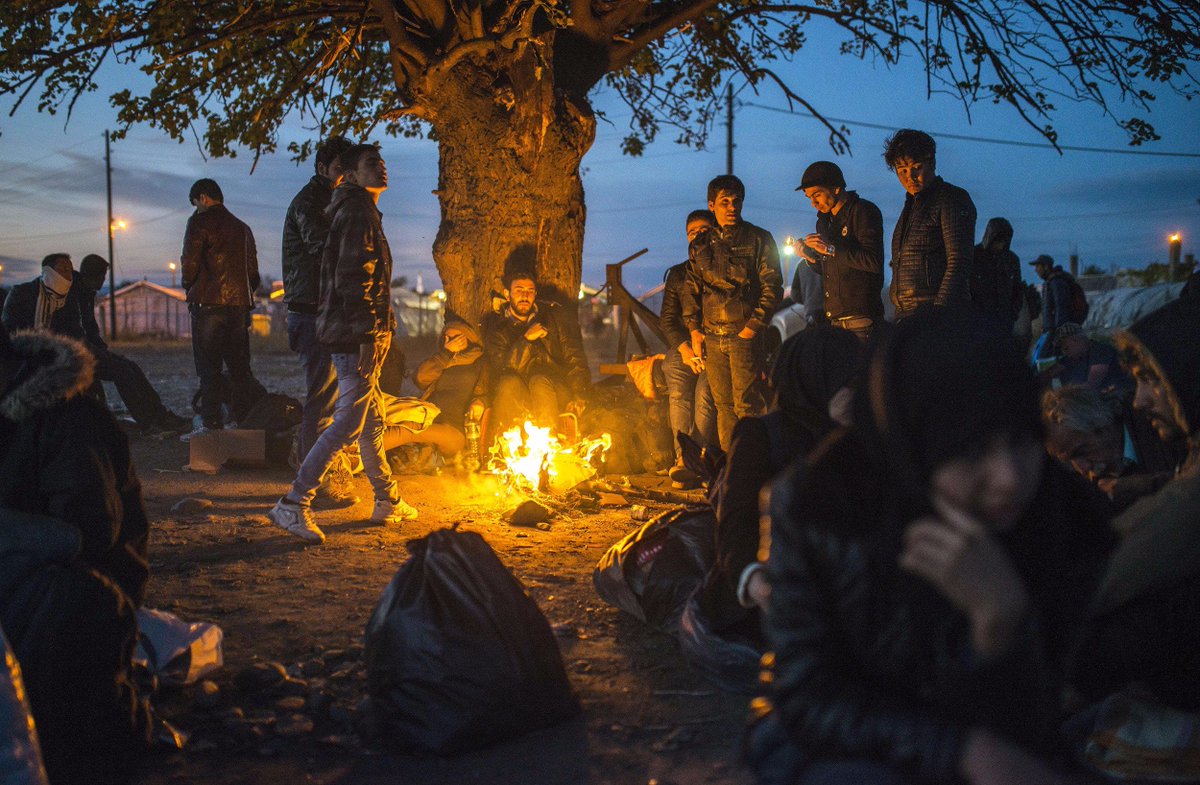
Migrants and refugees keep warm around a bonfire as they wait to enter a registration camp after crossing the Greek-Macedonian border near Gevgelija. The flow of refugees and other migrants from Turkey to Greece is expected to continue at a rate of 5,000 daily this winter, the UN refugee agency UNHCR said: photo by Robert Atanasovski / AFP, 8 November 2015
Where Go the Boats?
Dark brown is the river.
Golden is the sand.
It flows along for ever,
With trees on either hand.
Green leaves a-floating,
Castles of the foam,
Boats of mine a-boating --
Where will all come home?
On goes the river
And out past the mill,
Away down the valley,
Away down the hill.
Away down the river,
A hundred miles or more,
Other little children
Shall bring my boats ashore.
Robert Louis Stevenson (1850 - 1894): Where Go the Boats?
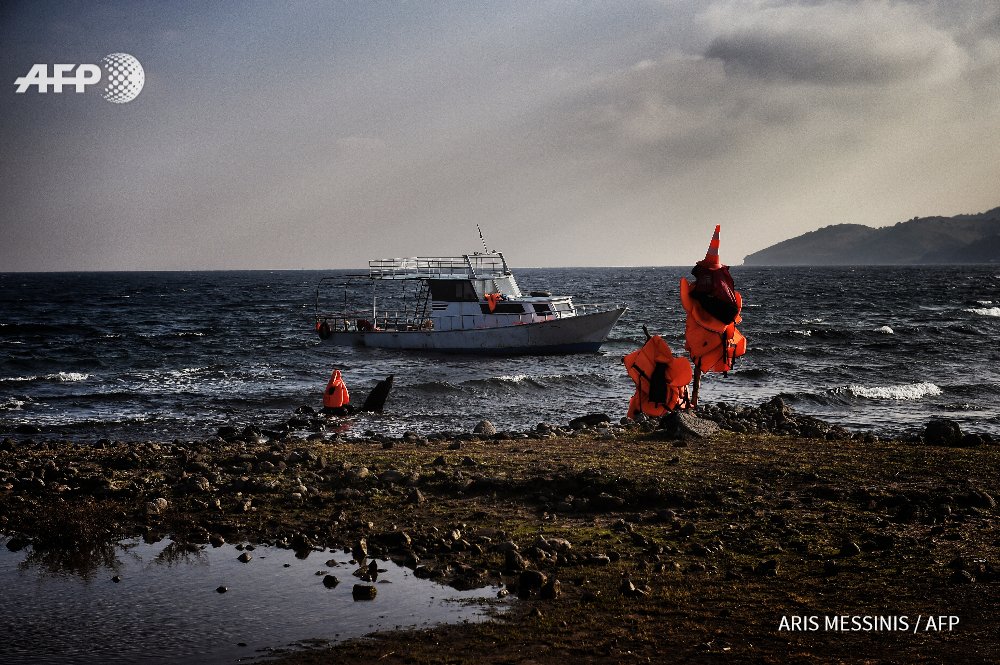
#Refugees and #migrants. Arrived. #Lesbos: image via Aris Messinis @Aris Messinis, 6 November 2015

#Refugees and #migrants arrive at #Lesbos: image via Aris Messinis @Aris Messinis, 6 November 2015
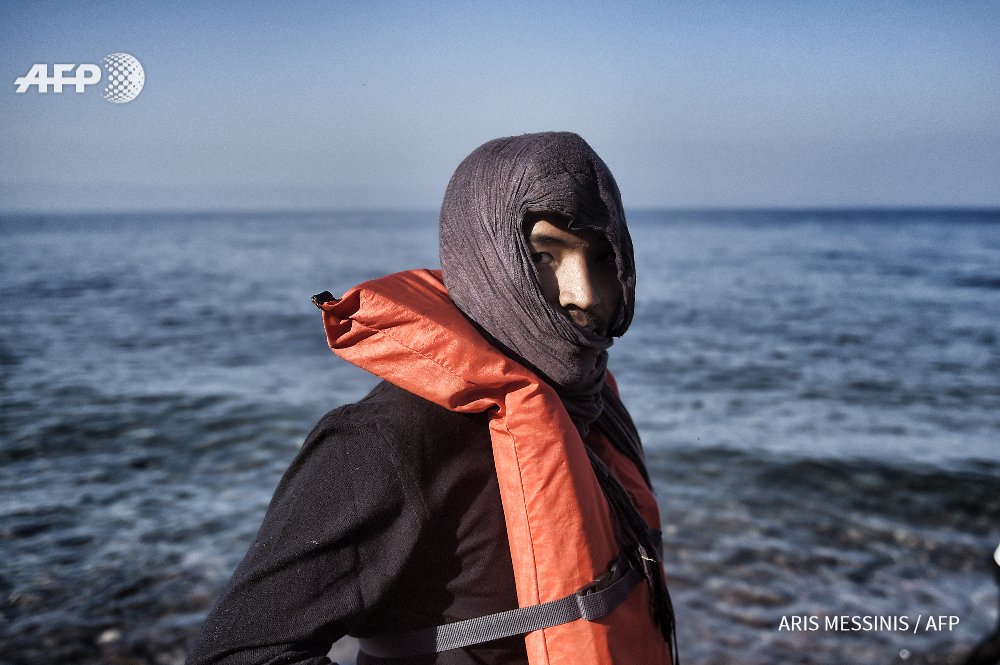
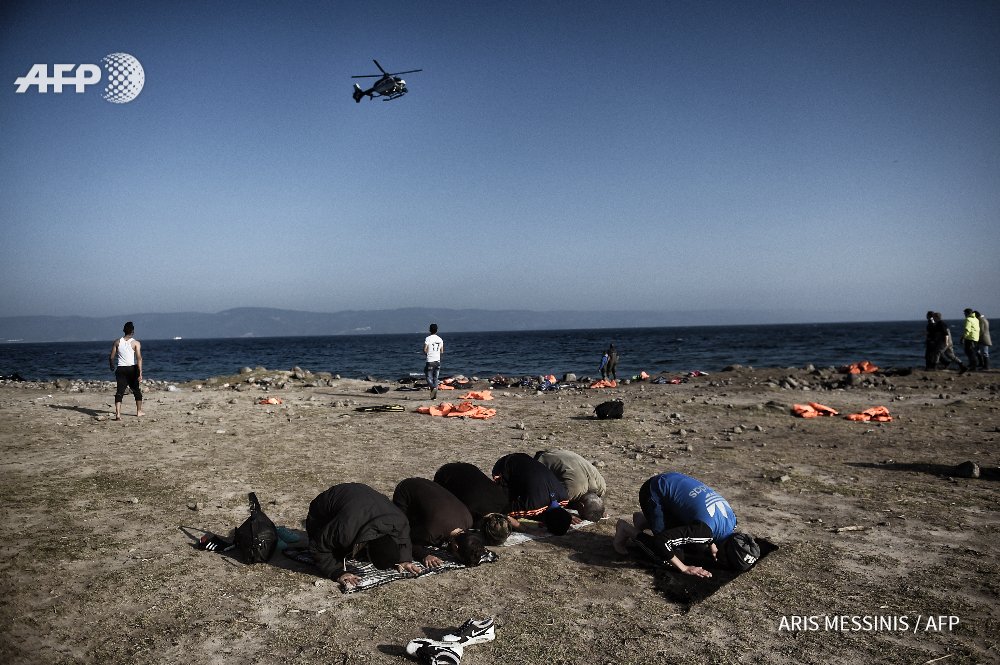
#Refugees and #migrants arrive at #Lesbos: image via Aris Messinis @Aris Messinis, 6 November 2015
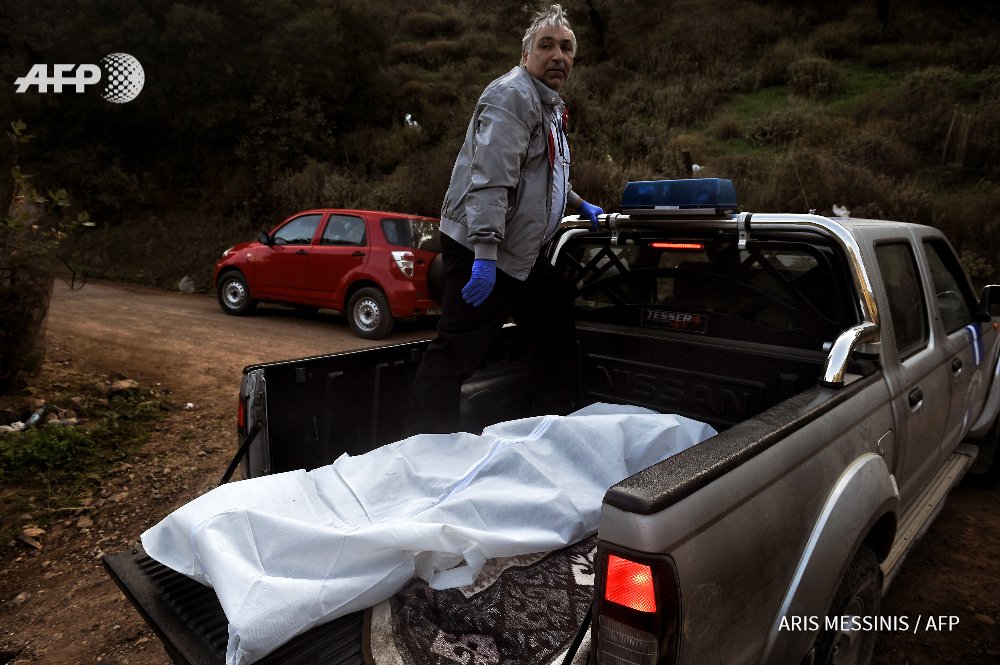
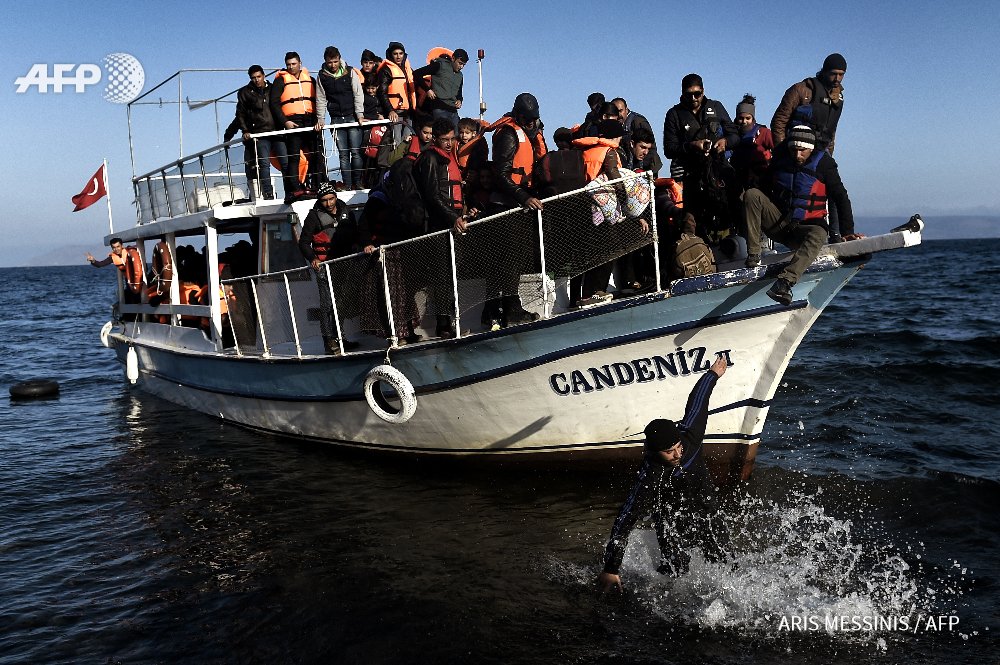
#Refugees and #migrants arrive in #Lesbos: image via Aris Messinis @Aris Messinis, 7 November 2015
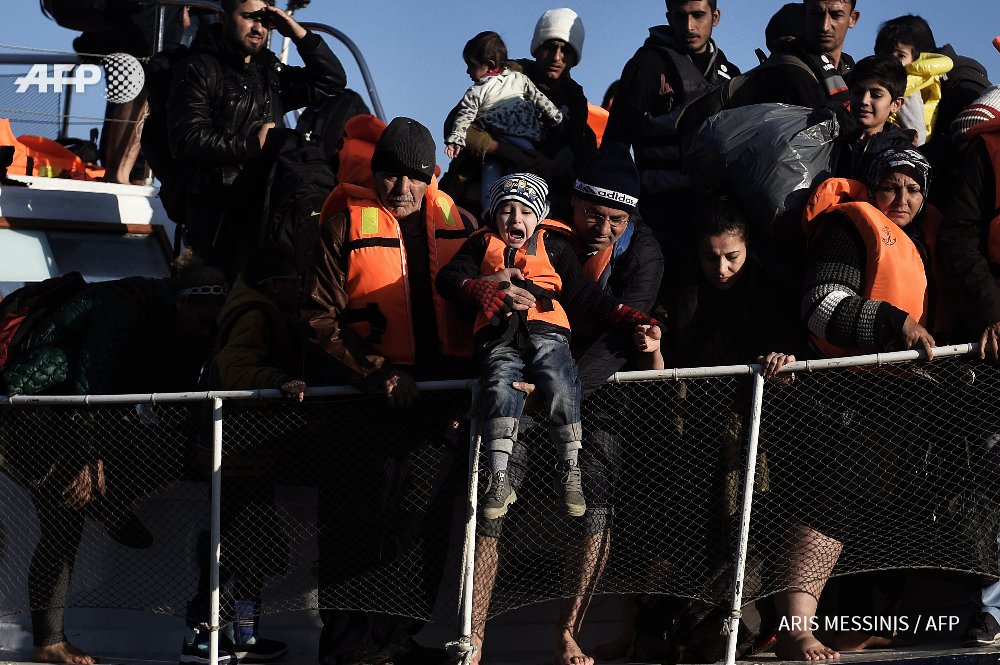
#Refugees and #migrants arrive in #Lesbos: image via Aris Messinis @Aris Messinis, 7 November 2015

#Refugees and #migrants arrive in #Lesbos: image via Aris Messinis @Aris Messinis, 7 November 2015
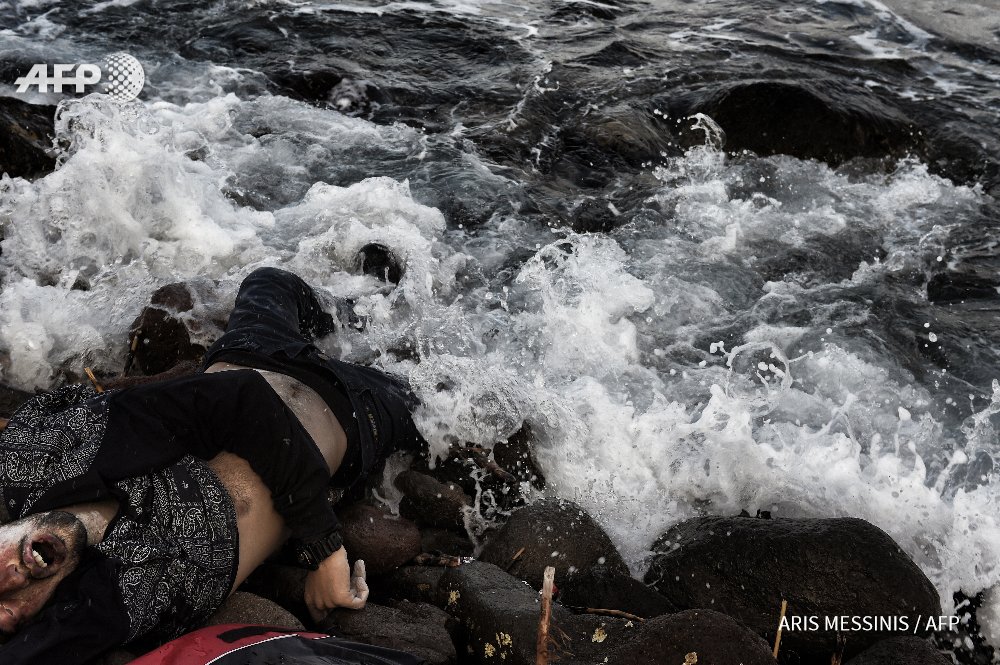
#Refugees and #migrants. It doesn't stop. #Lesbos beaches: image via Aris Messinis @Aris Messinis, 7 November 2015
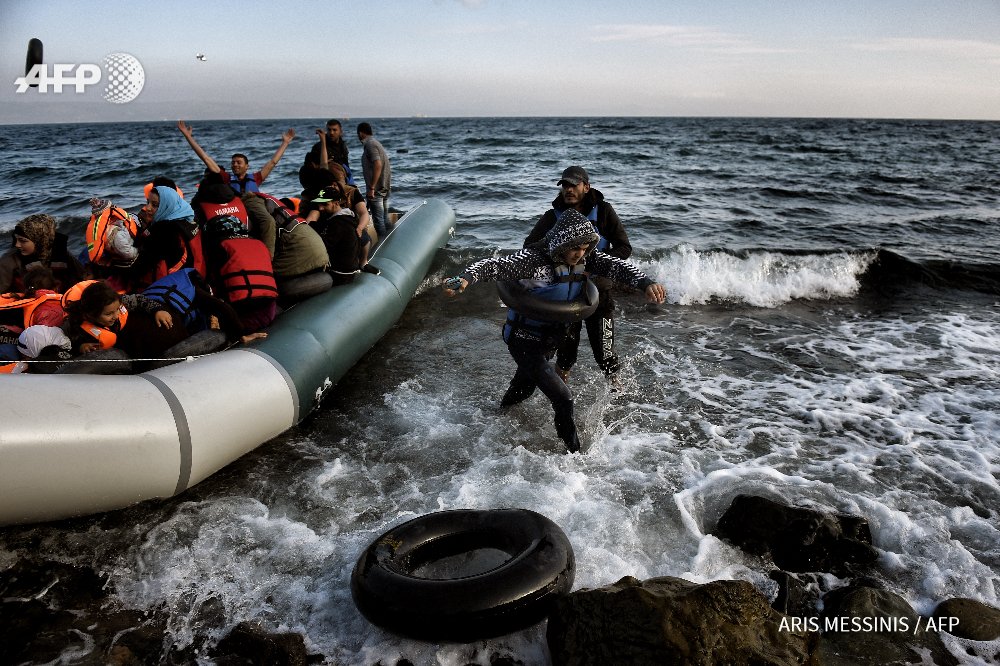
#Refugees and #migrants arrive in #Lesbos: image via Aris Messinis @Aris Messinis, 8 November 2015
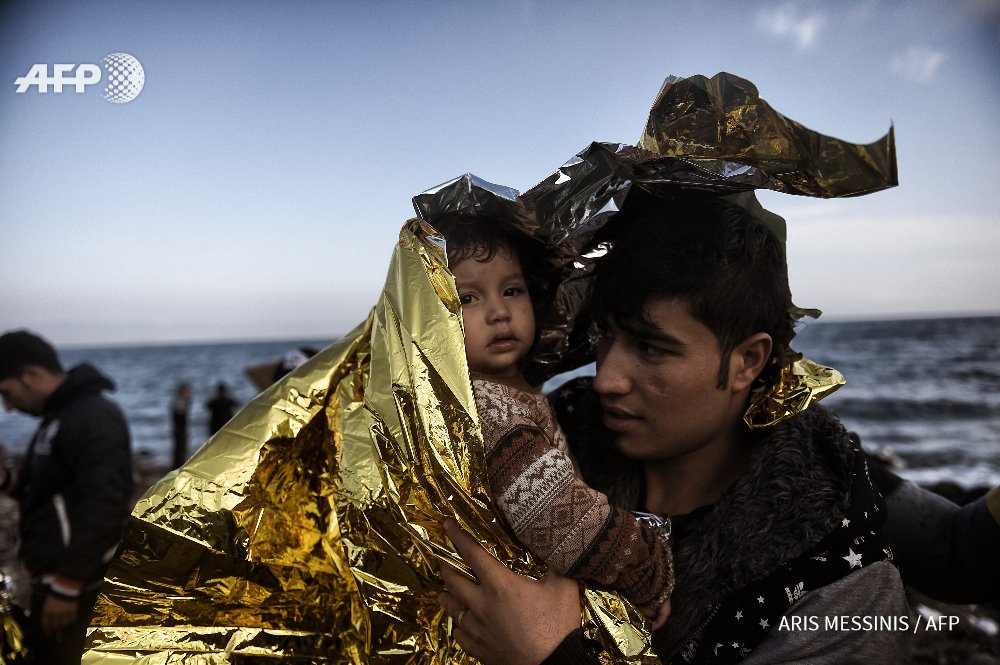
#Refugees and #migrants arrive in #Lesbos: image via Aris Messinis @Aris Messinis, 8 November 2015
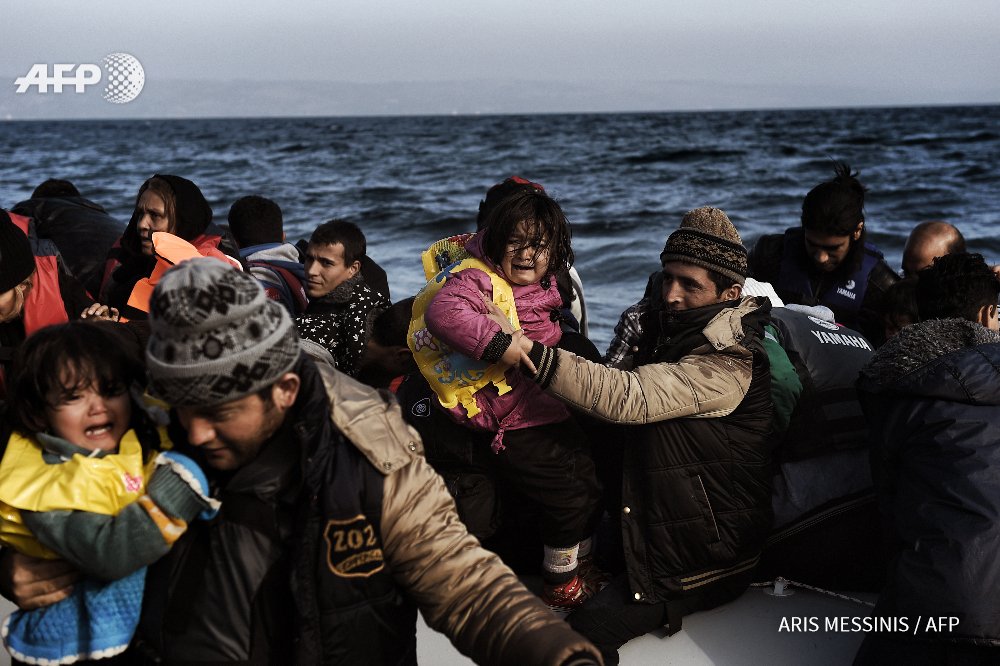
#Refugees and #migrants arrive in #Lesbos: image via Aris Messinis @Aris Messinis, 8 November 2015
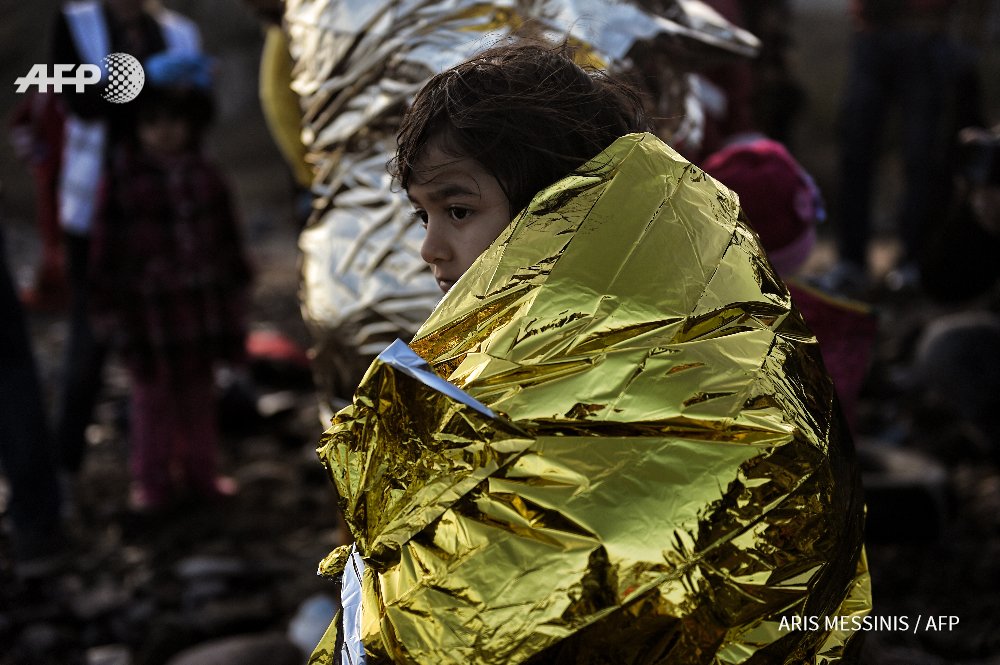
#Refugees and #migrants arrive in #Lesbos: image via Aris Messinis @Aris Messinis, 8 November 2015
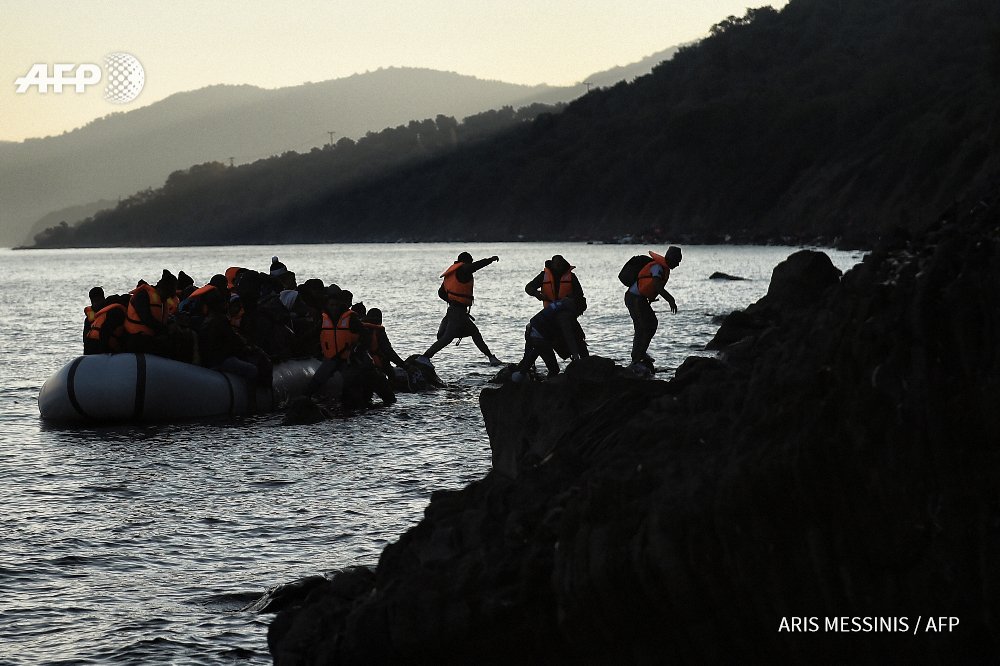
#Refugees and #migrants arrive at #Lesbos: image via Aris Messinis @Aris Messinis, 9 November 2015
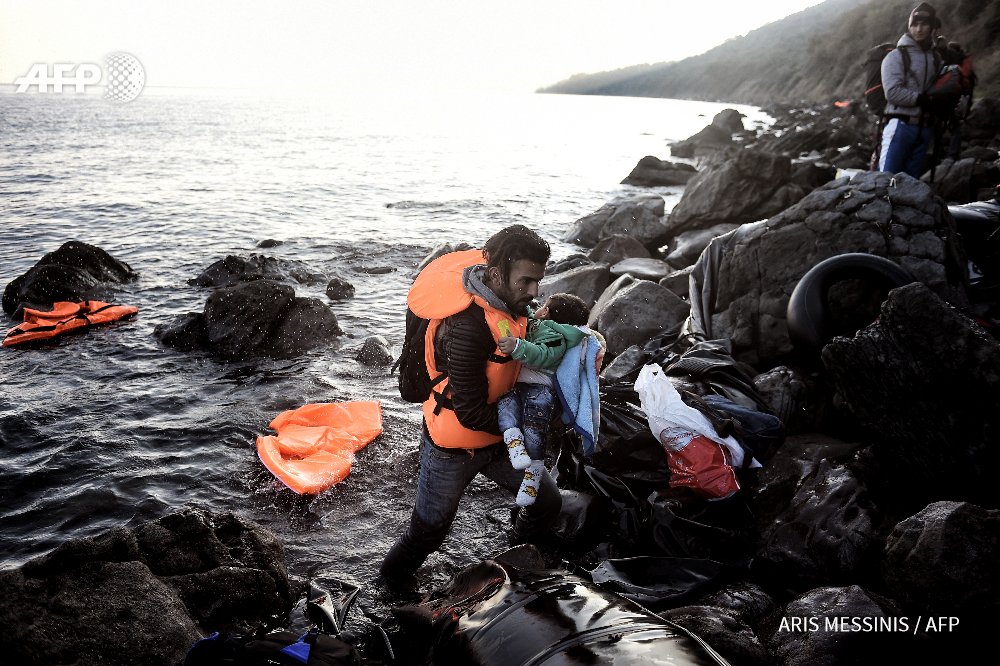
#Refugees and #migrants arrive at #Lesbos: image via Aris Messinis @Aris Messinis, 9 November 2015
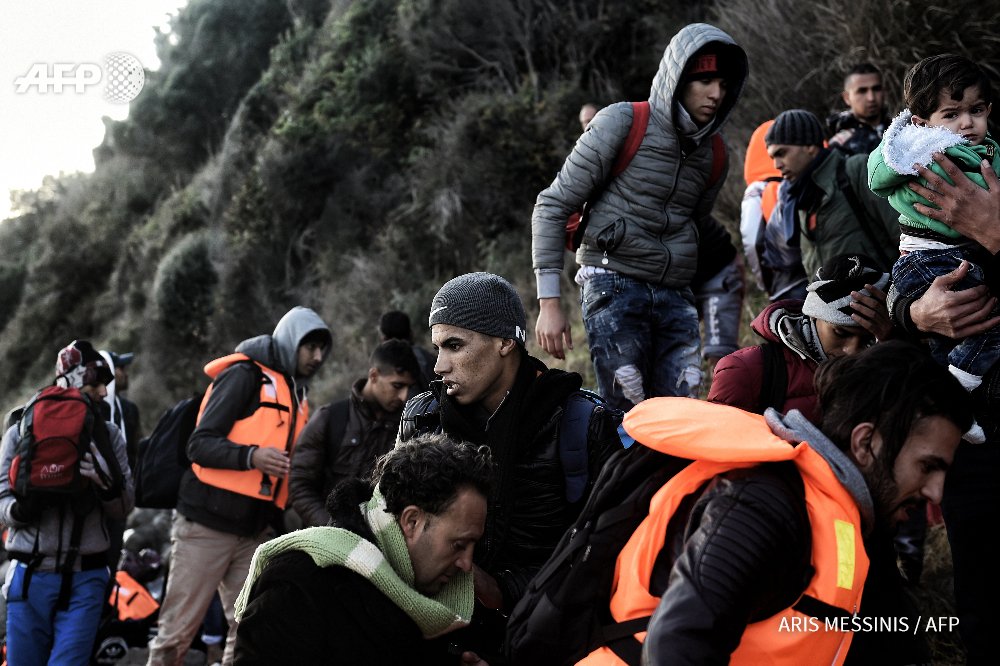
#Refugees and #migrants arrive at #Lesbos: image via Aris Messinis @Aris Messinis, 9 November 2015
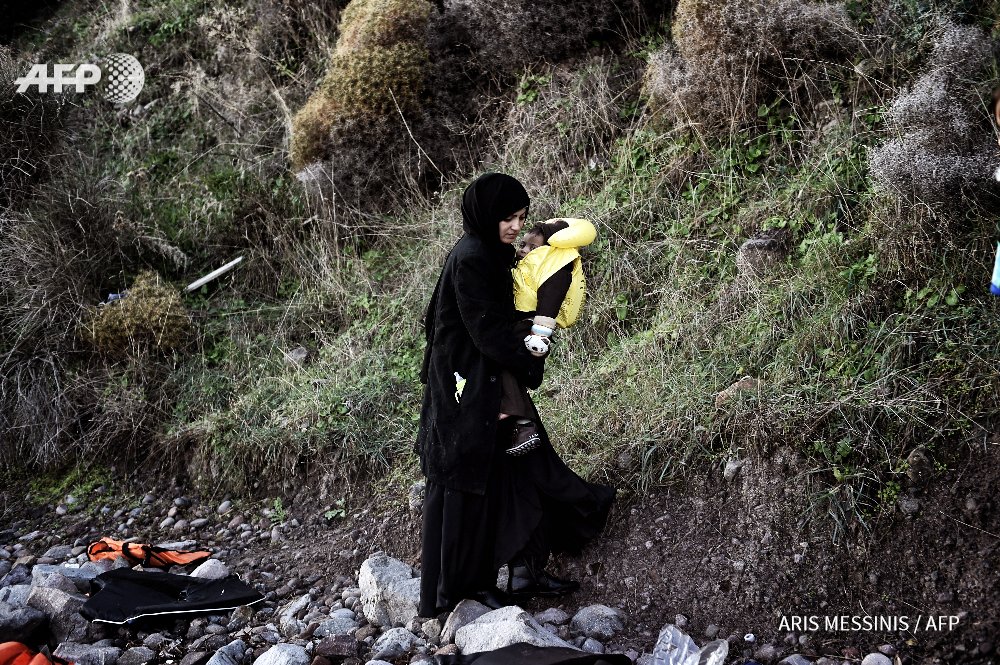
#Refugees and #migrants arrive at #Lesbos: image via Aris Messinis @Aris Messinis, 9 November 2015
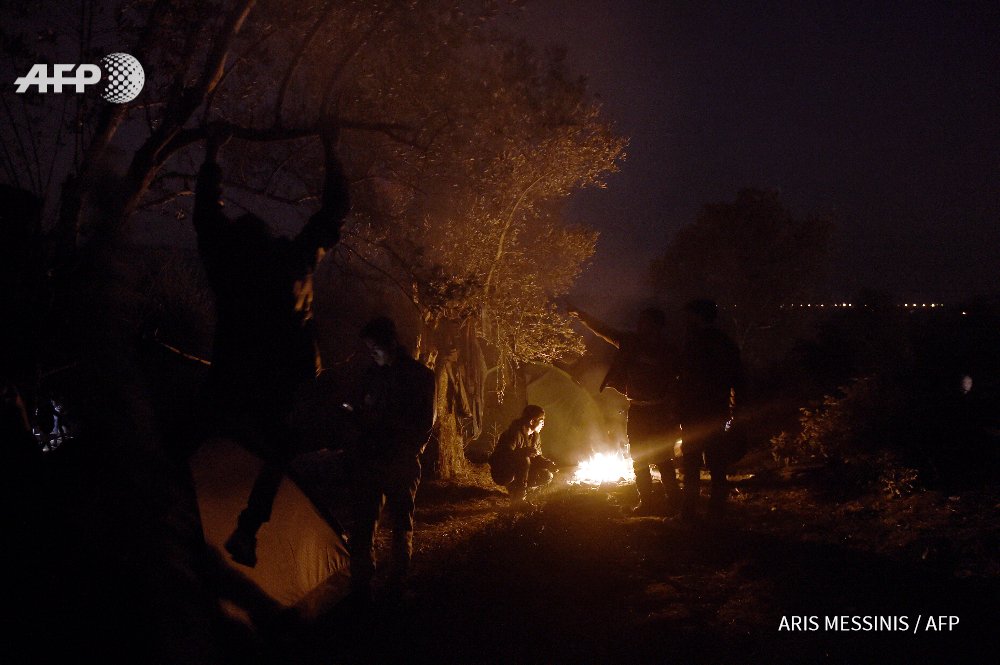
#Refugees and #migrants Moria "camp". #Lesbos: image via Aris Messinis @Aris Messinis, 10 November 2015

#Refugees and #migrants Moria "camp". #Lesbos: image via Aris Messinis @Aris Messinis, 10 November 2015
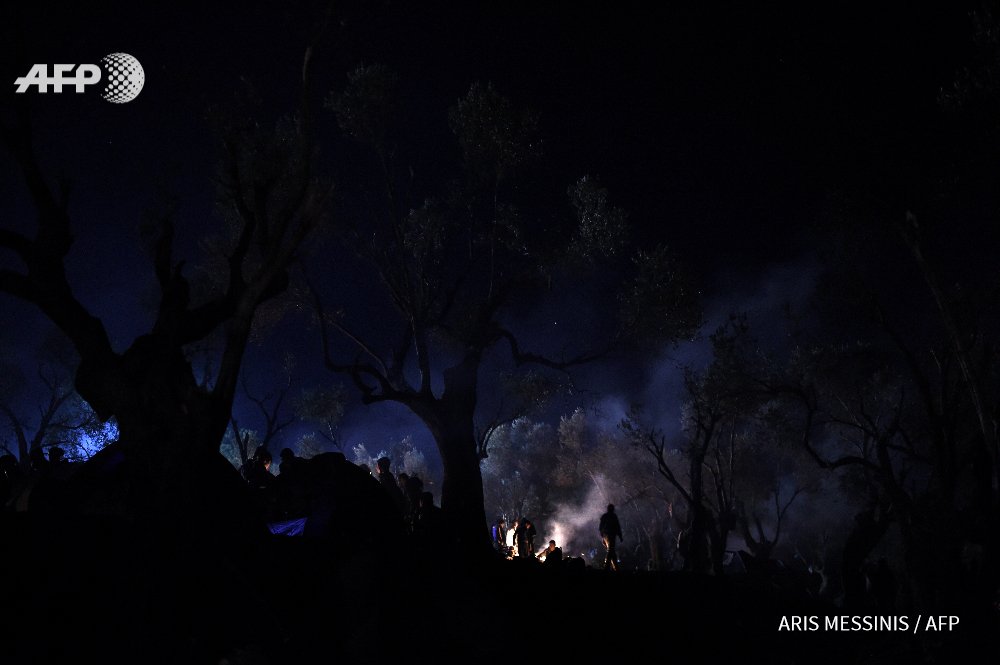
#Refugees and #migrants Moria "camp". #Lesbos: image via Aris Messinis @Aris Messinis, 10 November 2015
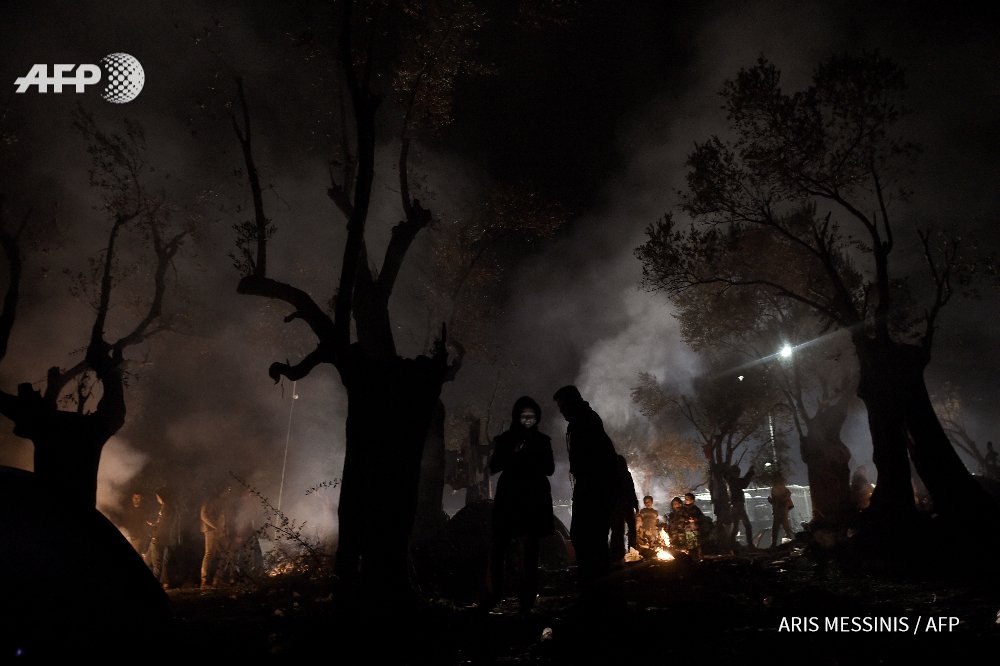
#Refugees and #migrants Moria "camp". #Lesbos: image via Aris Messinis @Aris Messinis, 10 November 2015

#Refugees and #migrants arrive at #Lesbos: image via Aris Messinis @Aris Messinis, 10 November 2015
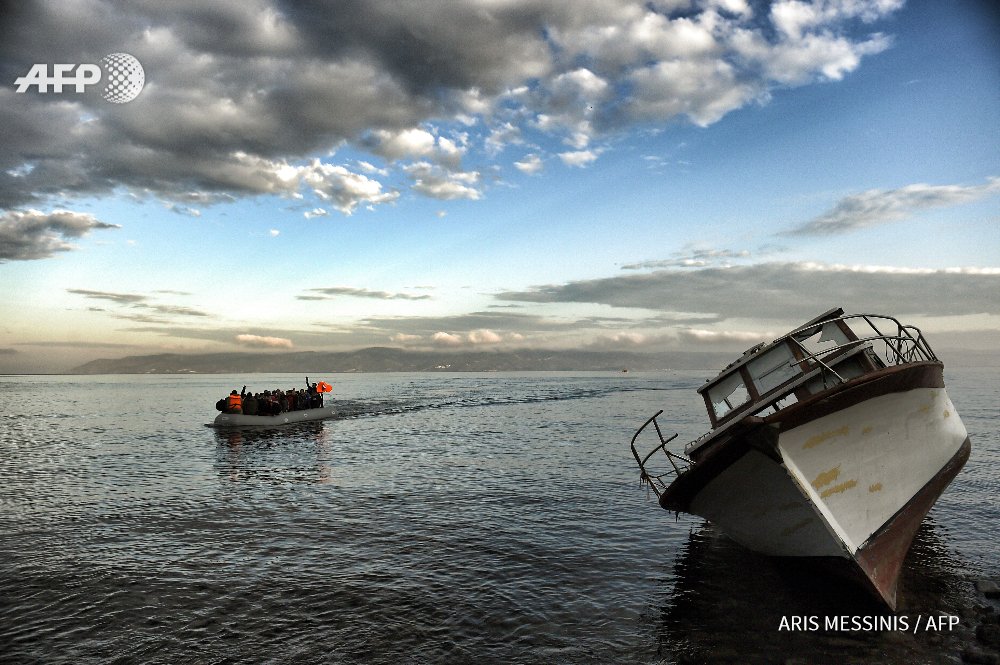
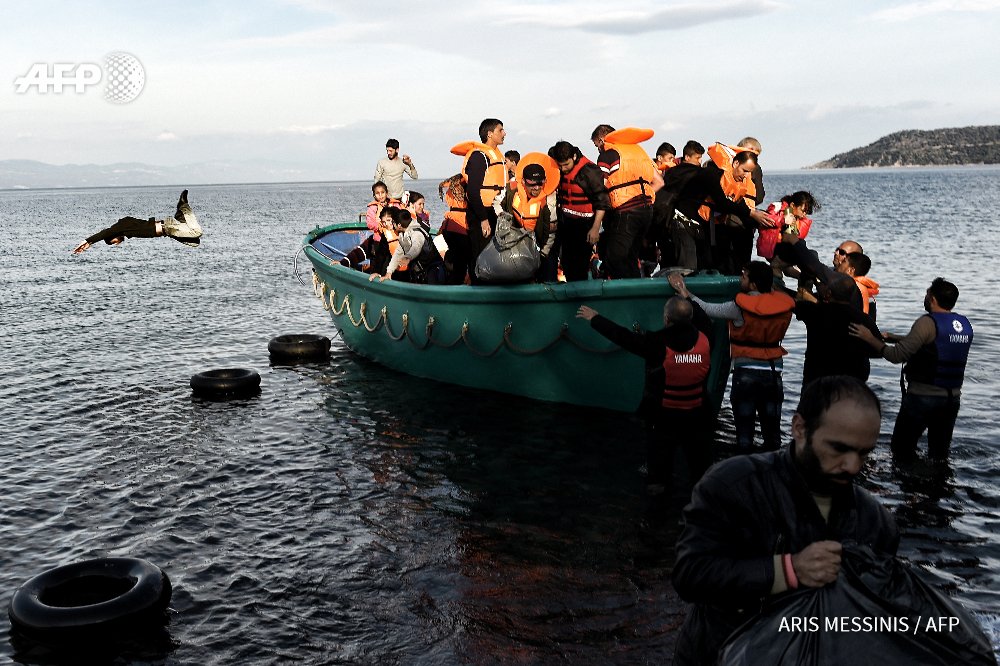
#Refugees and #migrants arrive at #Lesbos: image via Aris Messinis @Aris Messinis, 10 November 2015
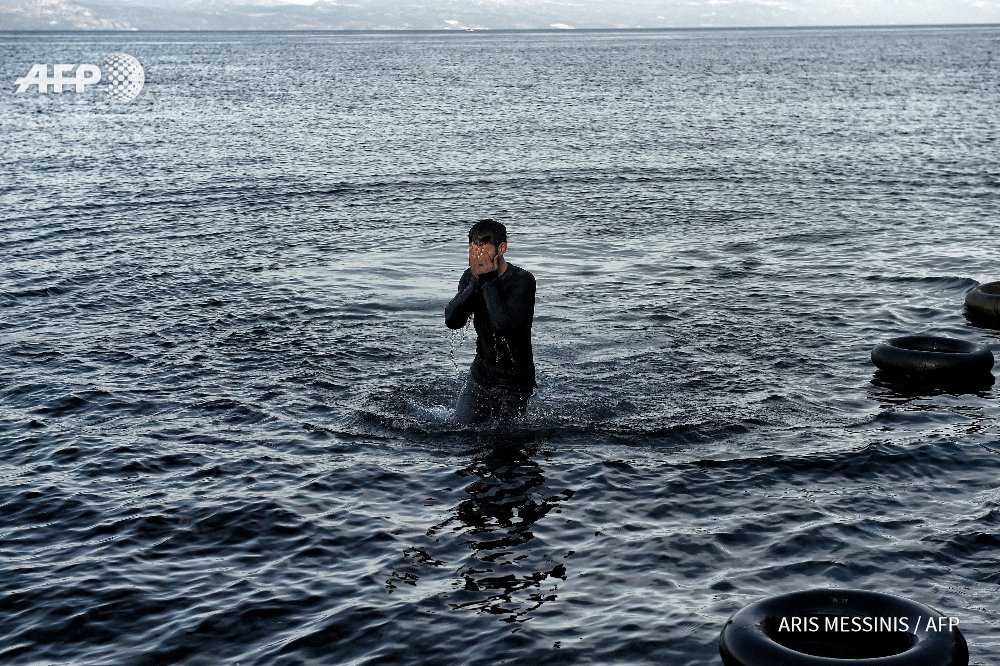
#Refugees and #migrants arrive at #Lesbos: image via Aris Messinis @Aris Messinis, 10 November 2015
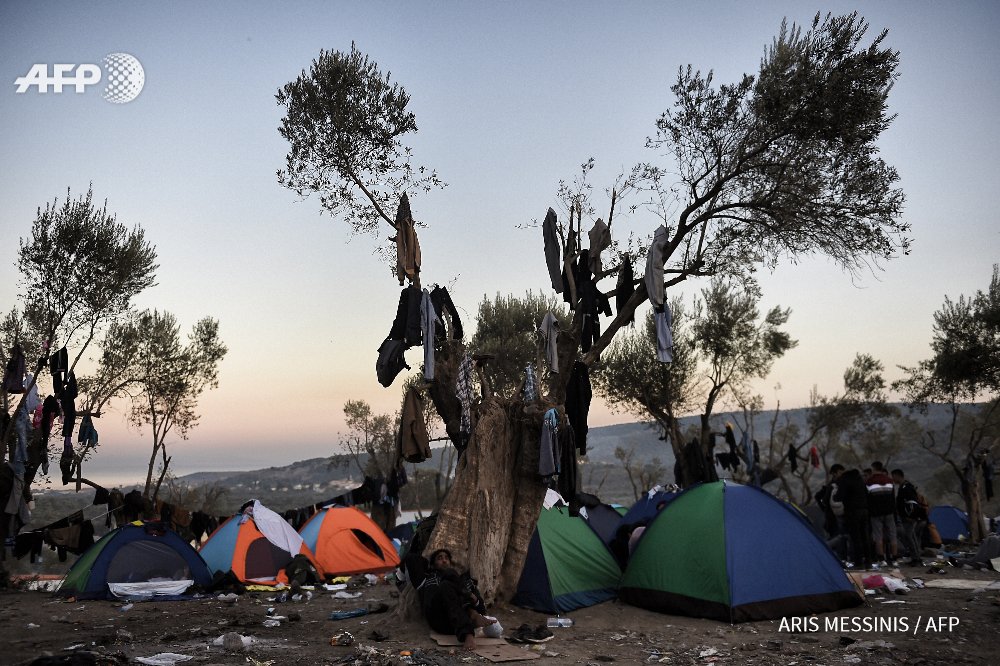
#Refugees and #migrants Live in Moria "camp" #Lesbos: image via Aris Messinis @Aris Messinis, 12 November 2015
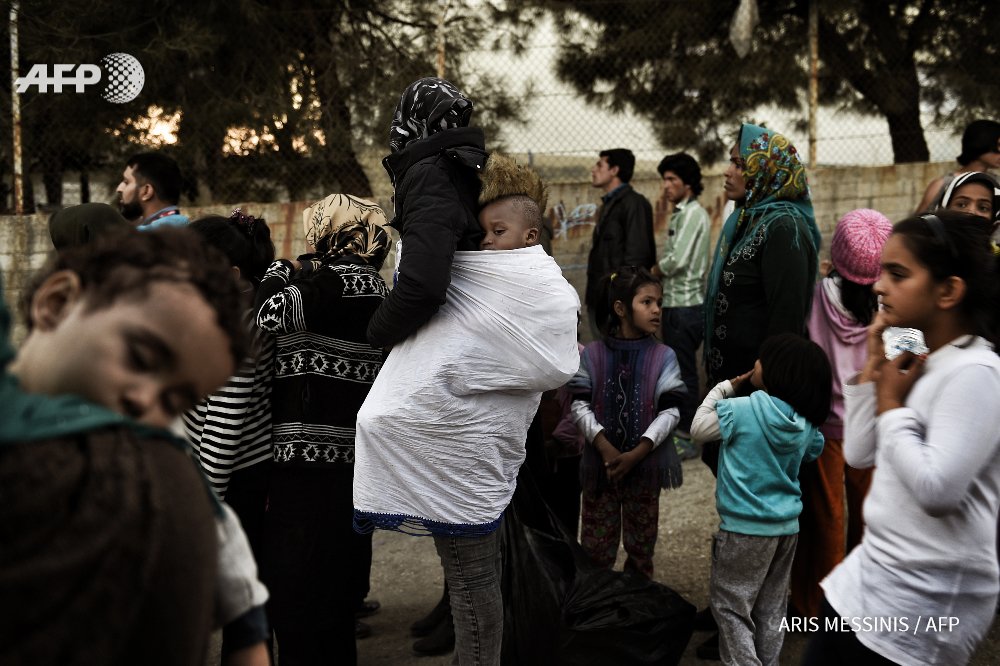
#Refugees and #migrants Live in Moria "camp" #Lesbos: image via Aris Messinis @Aris Messinis, 12 November 2015
Witnessing and intervention amidst the great migrant wave: Aris Messinis, AFP Correspondent, 6 November 2015

Children huddle under emergency blankets after arriving in Lesbos in October: photo by Aris Messinis / AFP
Lesbos, Greece, Nov 6, 2015 -- The most shocking
thing for me about covering this story is that you constantly realize
that you’re not in a warzone. That you’re working in a place where there
is peace. But the emotions that you’re capturing with your lens are the
same.
I’ve worked in Syria and Libya. I know what a warzone looks like. You expect to see things like this there. You don’t expect to see them on Lesbos.
The human pain is the same as in a war, but just knowing that you are not in a warzone makes it much more emotional. And much more painful.

A drowned child lies on a Lesbos beach: photo by Aris Messinis / AFP
It’s also hard because you have to capture the difficulties of these
people, and the pain of these people, but it’s not dangerous for you.
When you’re at a war, there are dangers for you, too, so somehow you’re
on a more equal footing with the people you’re covering.
But here, there are no dangers for you. That’s why there are many times when I drop my camera and I help people. Because you need to.

Aris Messinis carries a child ashore in Lesbos: photo courtesy of Petros Tsakmakis
There are so many boats, sometimes you’re working in a boat alone.
Sometimes the weather is bad, the approaches to the shore are difficult,
there are lots of rocks. You may be near the shore, but the danger is
still there. Many of these people don’t know how to swim. Especially the
babies.

A boat filled with migrants sinks off Lesbos in late October: photo by Aris Messinis / AFP
The babies get to me the most. Maybe it’s because I have a
six-month-old daughter at home. My worst moment of this story so far was
the last big shipwreck, when I went to the port and they brought the
first babies that had drowned and they were trying to bring them back to
life.

Medics try to revive a baby who was on a boat that sunk near Lesbos in late October: photo by Aris Messinis / AFP
I cannot even think about those scenes anymore. I try to erase them from my mind. We’re talking about babies. It’s just something that you can’t accept.

The body of a drowned baby is placed in a body bag in early November: photo by Aris Messinis / AFP

The body of a dead boy who washed up on Lesbos's shores in late October: photo by Aris Messinis / AFP

Water drips off the hand of a dead man whose body washed up on Lesbos's shore in early November: photo by Aris Messinis / AFP


The body of a drowned man washes up on Lesbos's shore in early November: photo by Aris Messinis / AFP

The body of a man who washed up on Lesbos in late October: photo by Aris Messinis / AFP

The body of a baby that washed up on Lesbos's shores: photo by Aris Messinis / AFP
Another bad thing are the sounds. This is something that you don’t
get from looking at my pictures. The complete panic. You hear people
screaming when they try to come ashore. The local residents are trying
to help them. There is pain all around them. There is complete panic.
Just complete panic.

A woman falls into the water with her child at a Lesbos beach after crossing the Aegean sea from Turkey in October: photo by Aris Messinis / AFP
I try to capture this in the picture and you get some of the shock,
some of the complete panic in the picture. But the reality is much more
shocking when you live it. When you hear the cries.

A girl cries as she holds on to her baby bottle after arriving in Lesbos in late October: photo by Aris Messinis / AFP
A few days ago, I carried a dead baby for hours. We scrambled to a
remote, rocky beach with some colleagues. It was impossible to reach, we
had to climb over many rocks and cliffs to get there. And when we got
there, we saw this baby, lying alone in the rocks. It had been there for
a few days, so it had started to smell. It was all alone in the rocks.
We decided to bring it back. So we put it in a bag and brought it up the cliff, so it could at least be buried.
When you see and live things life that, you think of your daughters and you think of how lucky they are.

The body of a drowned baby lies on Lesbos's beach in early November: photo by Aris Messinis / AFP
I have three daughters. One is nine, one is seven and the
six-month-old. I think of them all the time as I’m covering this story. I
think of how lucky they are. When I see people drowning and I see dead
babies on the shore, I think of how lucky they are to be alive, to have a
roof over their heads, to live in peace.

An Afghan girl is comforted after arriving on Lesbos in late September: photo by Aris Messinis / AFP
I will probably end up being more strict with them because of what I’ve seen.
Because when they start whining about something silly, like a toy, I will think of how lucky they are that they don’t have to go through this. I will try and teach them this. Of course I will do everything I can for them, but I will try to teach them more things now, things that I may not have taught them if I hadn’t covered this story.
They need to learn that happiness is breathing, seeing the sun, having somewhere to sleep.

Refugees and migrants wake up after spending a night in a Lesbos field in early October: photo by Aris Messinis / AFP
This story has made me think differently when it comes to my personal
life. When you see things like this every day, you realize how lucky
you are that you live in the West, that you were born in the West.

A Syrian couple waits with other migrants for a train in Macedonia in late August: photo by Aris Messinis / AFP
Every day, in the early morning, I drive my car from the hotel to the coastal zone. Lesbos has many, many beaches and cliffs. I use my binoculars to try and spot the boats in the sea. Once I spot one, I try and see where it will land and I go there and wait for it to come.
The boats come all day and all night. There are days that 80 boats can come.

Dinghies filled with migrants approach the Greek island of Lesbos after crossing the Aegean Sea in early October: photo by Aris Messinis / AFP
There are 45 to 60 people in a small boat, in bigger ones, there can
be 100 or more, so you get the idea. One day a ship came. A ship.
Of course there are happy moments, too. When they reach the shore, many of the refugees are happy.

A man falls to his knees as he gets to Lesbos in late October: photo by Aris Messinis / AFP
But for me, the bad moments overshadow the good ones. Plus I know
what lies ahead for these people. I followed refugees this summer as
they made their way from Greece to northern Europe. I did the trip, I
know what they will face.
There is no welcome for them in Europe. They may be happy to reach the beach, but it’s only the beginning.

A soaked family arrives on the shores of Lesbos in late September: photo by Aris Messinis / AFP
Sometimes they ask me, what’s going to be next and I tell them: This
is only the beginning. Maybe it’s gotten a bit better since this summer,
at least they’re not facing the smugglers and the process has been
smoothed out a bit. But still, they have a long road ahead of them.

Syrian refugees walk near the Hungarian town of Horgos in early September: photo by Aris Messinis / AFP
No one has ever told me to my face, but sometimes I feel it unsaid
from colleagues, that when I drop my camera and help, I shouldn’t be
doing so, because I’m not doing my job, I might miss a shot.

Aris Messinis carries a child ashore in Lesbos in early October: photo by AFP
I don’t think I miss anything. But even if I do miss something, I
don’t care. Go ahead and judge me. I would like for there to be many
more hands here so I don’t have to stop working and help, so I can just
do my job. But there aren’t. And when I see a baby in the water, about
to drown, well I just stop shooting and I pluck it out.

A baby is passed from hand to hand after arriving in Lesbos in early October: photo by Aris Messinis / AFP
Some colleagues do the same thing. Some choose not to. I don’t judge.
It’s a choice. We still live in a free country and you decide for
yourself. But I have to say that I don’t like it when someone needs your
help and you don’t help them.

A man swims toward the shore of Lesbos in early October: photo by Aris Messinis / AFP
I’ve been here a few weeks this time around. I will stay one more week, then go home and rest and then will come back.
This is something that we have to show to the world. This is something that will not stop.
These people will keep coming, risking everything. The weather will soon get worse and it will become much worse as the winter sets in.
Maybe if we keep showing these things, maybe something will change. I hope so.
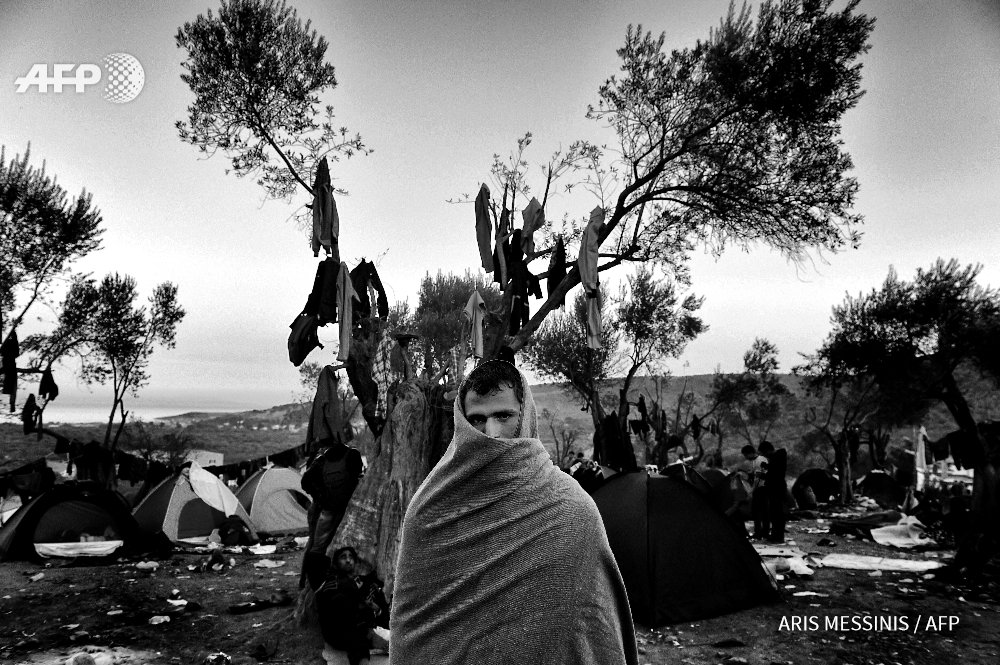
#Refugees and #migrants Winter is coming. #Lesbos, Moria: image via Aris Messinis @Aris Messinis, 12 November 2015
Out in the Cold
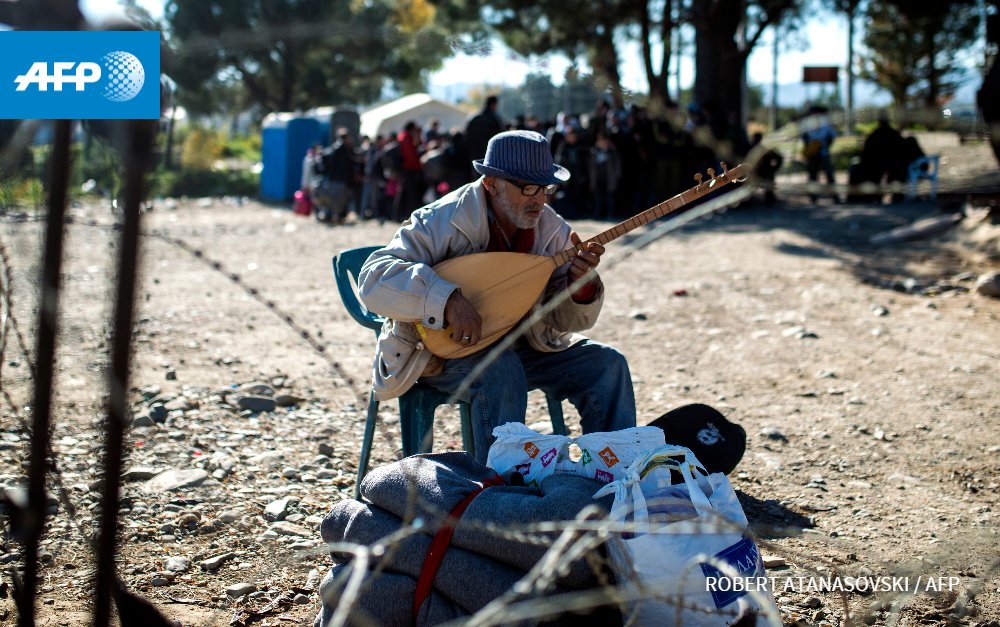
A Syrian man plays a string instrument while #migrants and #refugees cross border near Gevgelija. #AFP @RAtanasovski: image via Aurelia BAILLY @AureliaBAILLY, 13 November 2015

A #Syrian man plays music while other #migrants and #refugees cross the Greek-Macedonian border: image via Christophe Delattre @chrisdelattre7, 13 November 2015
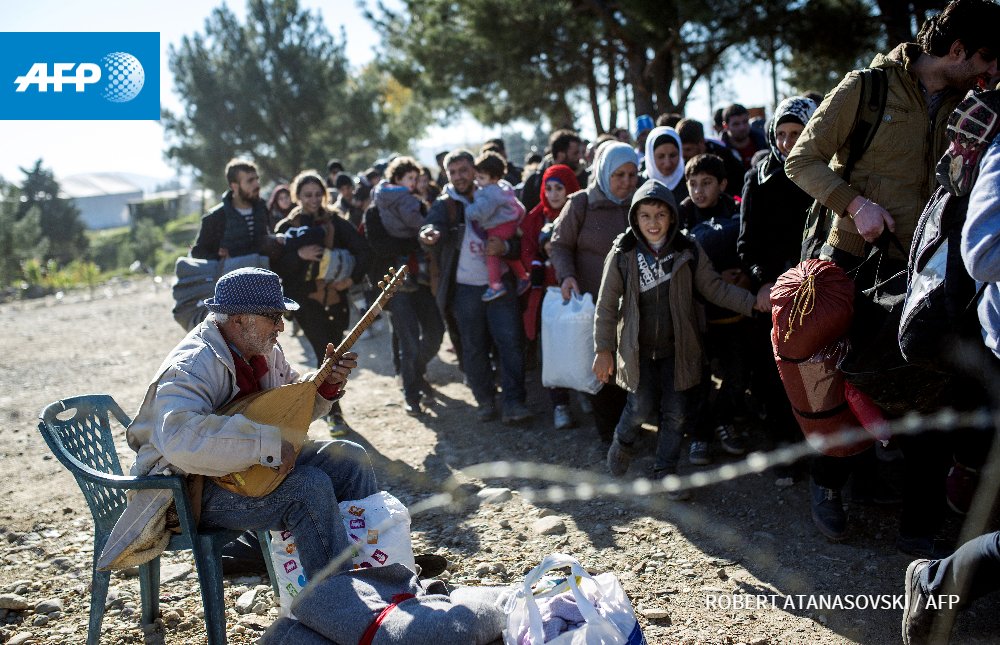
#migrants and #refugees cross the Greek-Macedonian border near Gevgelija. #AFP @RAtanasovski: image via Aurelia BAILLY @AureliaBAILLY, 13 November 2015
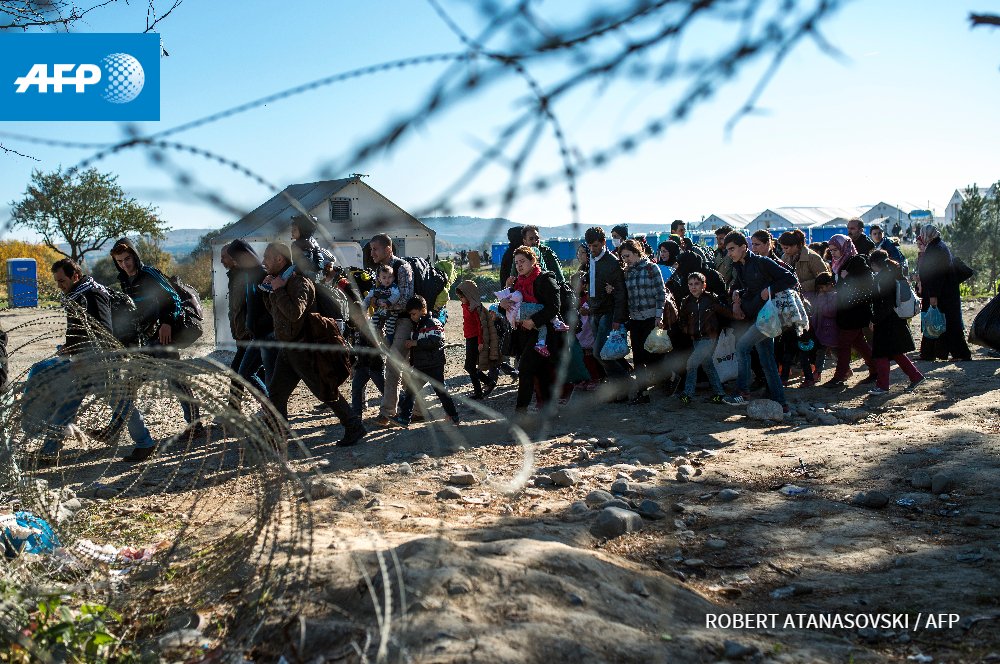
#migrants and #refugees cross the Greek-Macedonian border near Gevgelija. #AFP @RAtanasovski: image via Aurelia BAILLY @AureliaBAILLY, 13 November 2015
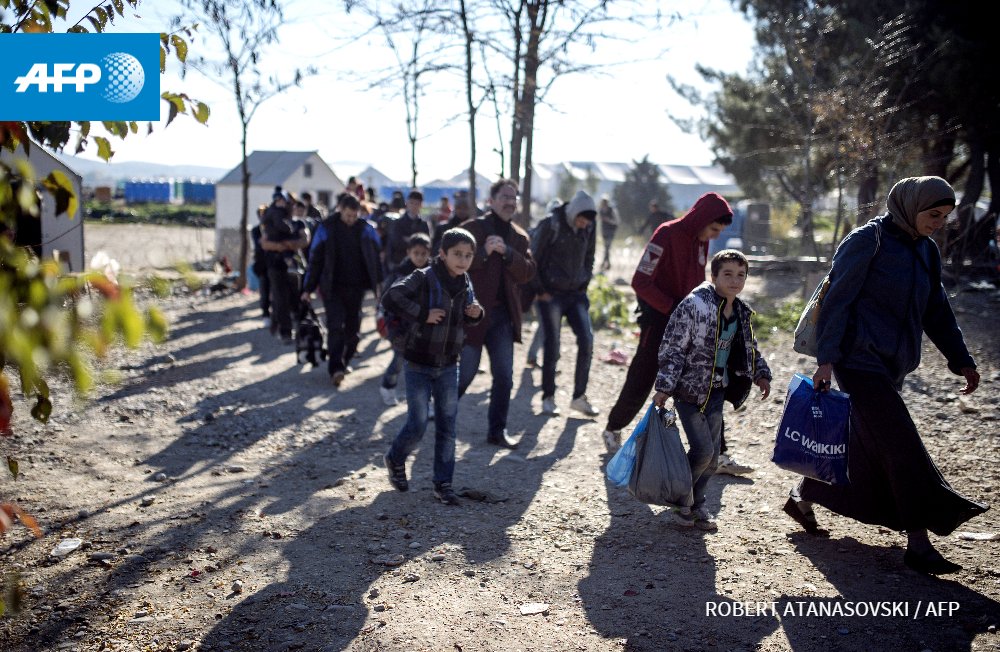
#migrants and #refugees cross the Greek-Macedonian border near Gevgelija. #AFP @RAtanasovski: image via Aurelia BAILLY @AureliaBAILLY, 13 November 2015
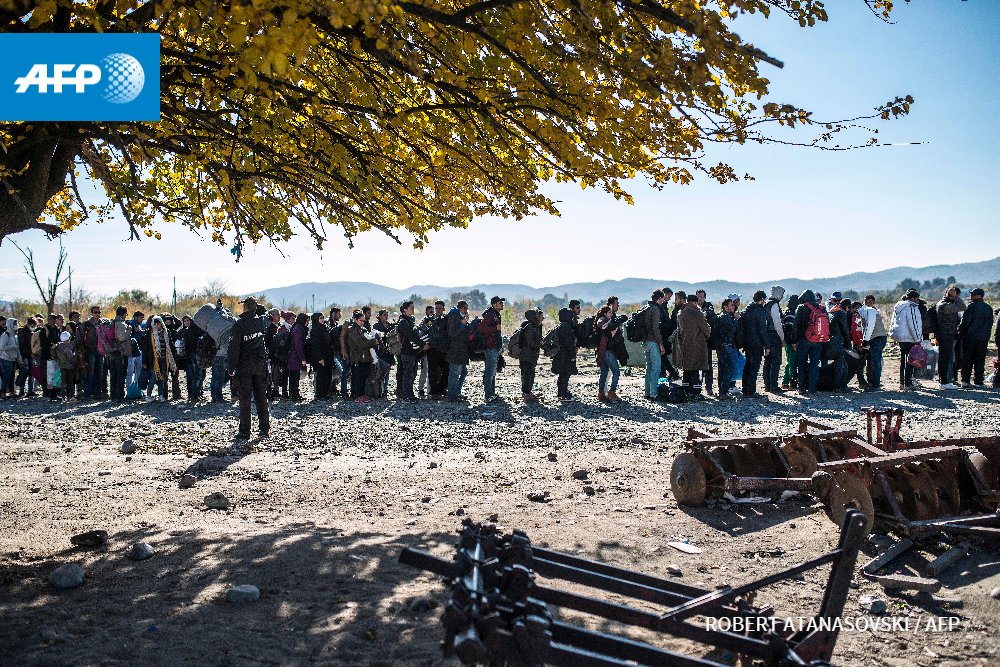
#migrants and #refugees wait to enter a registration camp near Gevgelija. #AFP #Photo by @RAtanasovski: image via Aurelia BAILLY @AureliaBAILLY, 12 November 2015

#Macedonia: Migrants and refugees walk to catch a bus to Serbia near Gevgelija by @RAtanasovski: image via Talar Kalajian @TalarKala, 10 November 2015

#migrants and #refugees at the Greek-Macedonian border near Gevgelija. #AFP #Photo by @RAtanasovski: image via Aurelia BAILLY @AureliaBAILLY, 10 November 2015
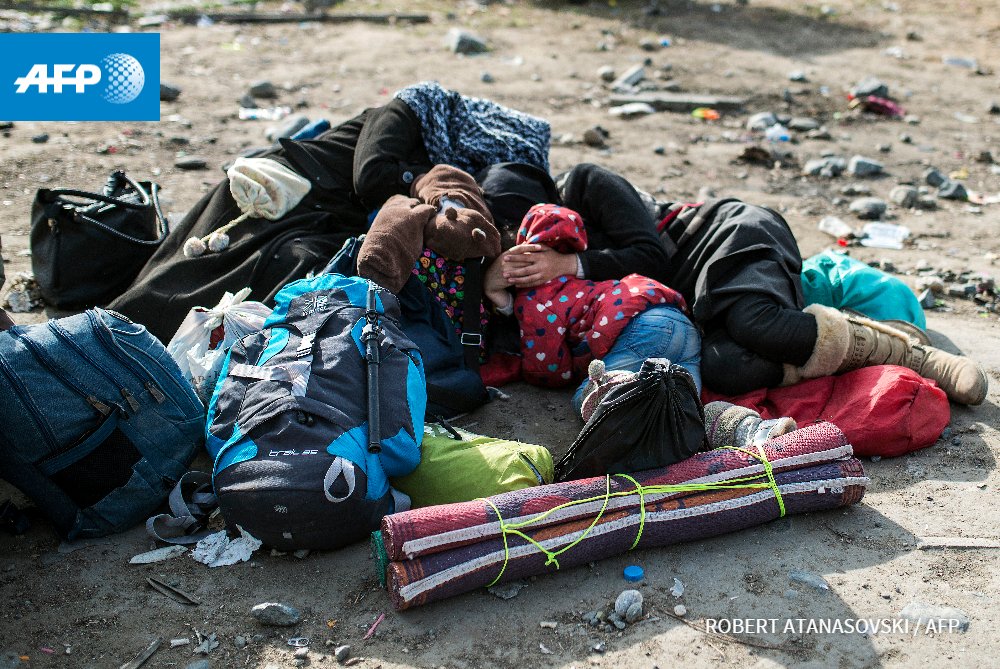
#migrants and #refugees at the Greek-Macedonian border near Gevgelija. #AFP #Photo by @RAtanasovski: image via Aurelia BAILLY @AureliaBAILLY, 10 November 2015
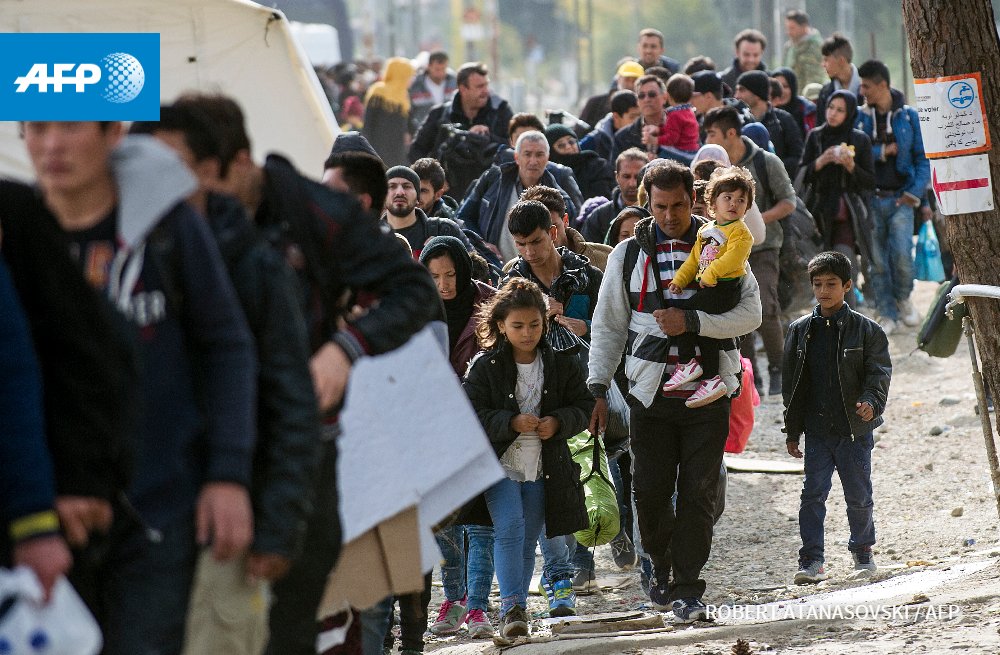
#migrants and #refugees at the Greek-Macedonian border near Gevgelija. #AFP #Photo by @RAtanasovski: image via Aurelia BAILLY @AureliaBAILLY, 10 November 2015
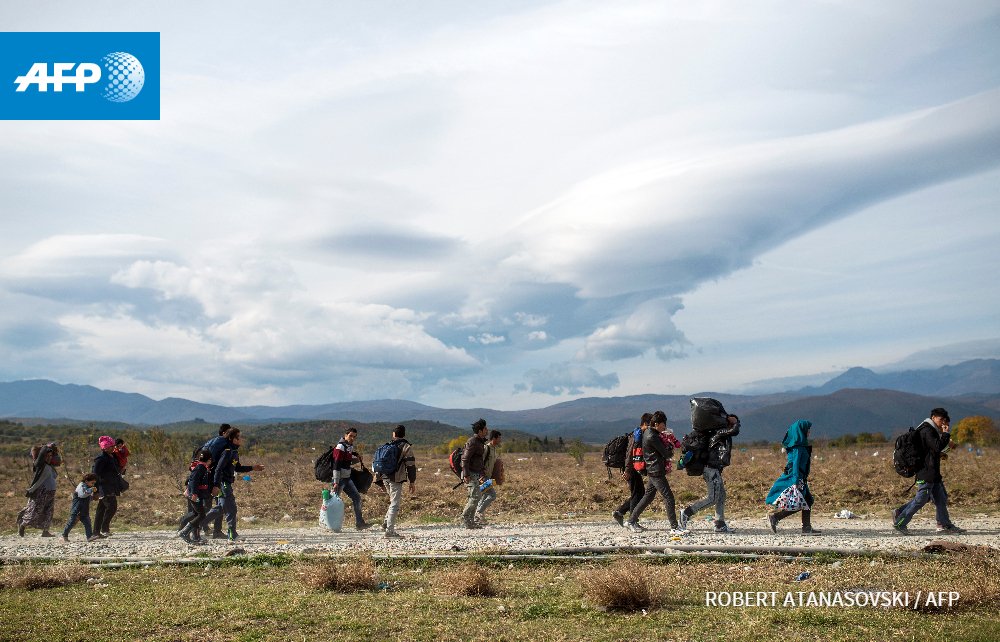
#migrants and #refugees cross the Greek-Macedonian border near Gevgelija. #AFP #Photo by @RAtanasovski: image via Aurelia BAILLY @AureliaBAILLY, 10 November 2015

Migrants and refugees wait for a bus to Serbia after visiting a registration center in southern Macedonia: photo by Robert Atanasovski/Agence France-Presse, 11 November 2015

#migrants and refugees crossing the Greek-Macedonian border near Gevgelija. #AFP @dilkoff: image via Aurelia BAILLY @AureliaBAILLY, 13 November 2015
Sally Go Round the Roses
ReplyDeleteWhere will all come home?
ReplyDeleteThat Syrian passport that turned up with such alacrity in the wake of the Paris attacks will figure in every argument for closing the borders. There are people already talking about following Israeli models of security (a quick scrawl through the posts at Beyond the Pale would give people a good idea of what that means).
What do we call home, this Europe, where we've long since forgotten that "...happiness is breathing..."?
The old man playing the long-necked instrument (a bağlama?) with the little boy: a suggestion that humans are not all vicious predators, despite so much evidence to the contrary.
ReplyDeleteI appreciate very much your bringing a human dimension to the events which our tv screen both connects us to and separates us from.
ReplyDeleteAbout Robert Louis Stevenson - I was introduced to "A Child's Garden of Verses" 60 years ago. I now have infant grandnieces and grandnephews, and I have formed a resolve to give them a copy of this book when they are old enough, if fate allows. And speaking of poetry for children, I very much enjoy the Dover collection "How to Eat a Poem".
WB,
ReplyDeleteThat passport was probably purchased along with the rest of the party paraphernalia.
There are so many challenges to mind, heart, conscience, in all this, more, it seems, every day now..
Plainly we'd not get through a day perhaps even an hour were we cursed or blest with the ability (or worse, irresistible inner demand) to assimilate ourselves into the experience of a world outside ourselves. Still, it's painful and a lot of work, to be aware, to be prepared to feel.
By helping us to remember, as also by teaching his children, that (for example) happiness is breathing, Aris Messinis has done a great thing.
Messinis, who comes from Athens, and Robert Atanasovski, who hails from Skopje, are the chroniclers of these movements of the peoples.
Not for a very long time will any of this be understood -- if even then...
Meanwhile it's necessary simply to see, to know, to reflect, to feel, to revalue.
Again, not easy for anybody. Just necessary.
Mistah Charlie, many thanks -- and maybe now is the time, before fate has a chance to interfere with their getting any older (i.e. less instinctively wise).
Terry, Exquisite knowledge as befits a scholar and master of the music of bent strings and deep bowls.
I pondered upon those pictures of the old man with the bağlama, and wondered -- how did he haul such a delicate instrument all the way across water and over roads and fields and across closely watched borders...
Plainly it's not just a new toy. Unless ancient Hittite stringed instruments may be thought of as new toys.
I'm sure you, as an aficionado and player, know people who do now in the XXI century, out here in the territories of the infidel, actually own and play a bağlama (or a saz as it's otherwise known). (Lu Edmonds of the Mekons, for example, has been doing that for quite a while.}
I mean, out here, where we have great traditional acts like California Death Surf Metal Chainsaw Only Kidding Hell Eagles, and bright lights and loud dumb noise seem to be the necessary features of all Friday night entertainment of choice, obviously the bağlama doesn't get a whole lot of play.
One exception might be this brilliant musician.
Çetin Akdeniz -- Söğüdün Erenleri
He has made a "Western audience" a wee bit more aware of the ancient art of the bağlama (and its several similar stringed cousins).
And why is that?
Because that same video has been posted with the virtuoso performer identified as...
Quentin Tarantino!!
That is very nice playing by Mr. Akdeniz. Though I don't know anyone who plays the bağlama, the instrument is in the same general family as the Greek bouzouki, which made its way into traditional Irish music in the '70s, thanks to Johnny Moynihan, better known as a singer. Here he seems to repudiate his great innovation: https://www.youtube.com/watch?v=dQWLA2GHfO8. I would love to know the story of the the old man in the photo in your post. I know if I were fleeing Isis, my accordion would be the possession I would most want to take with me. (Though a harmonica would be a lot more convenient.)
ReplyDeleteLovely that. But one wonders -- what does Johnny REALLY think about the Celtic bouzouki rage?
ReplyDeleteWe'll never know who he is, that old Syrian lute player at the Greek-Macedonian border, or where exactly he came from, or where he might end up... though it's very difficult at this point to imagine any substantial comforts could be waiting in store for him -- and for that matter almost as hard to think that he could ever be construed as a threat to anybody, or indeed to see much solace for anybody in that picture, there at the border, as night and winter come down.
What's not in doubt though, and what's really a lot more reassuring to the humble soul than almost anything I've seen all week -- is the oldtimer's laudable honouring of the social / communal function of his art. He's playing for the people, if anyone ever was. And no one is running away, or hiding under a table in the bistro, or waving a flag and weeping or lighting a candle and singing the marseillaise or calling everyone they know on speed dial.
The Saz Gives Lu Edmonds Of The Mekons A Good Excuse For A Rousing Anthropological Lecture: "Actually the Turkish bouzouki is the Greek saz..."